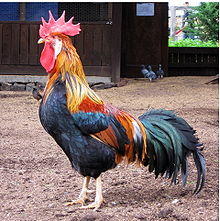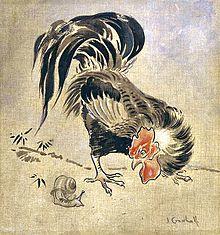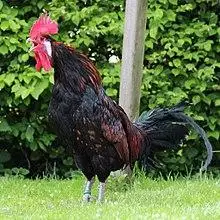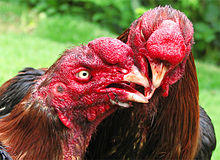
A rooster or cock is the adult male chicken, Gallus gallus domesticus. A younger male may be called a cockerel; a male that has been castrated is a capon.
There are numerous cultural references to cocks and cockerels, in myth, folklore and religion, in language and in literature.
Etymology
According to Merriam-Webster, the term "rooster" (i.e. a roosting bird) originated in the mid- or late 18th century as a euphemism to avoid the sexual connotation of the original English "cock",[1] [2][3] and is widely used throughout North America. "Roosting" is the action of perching aloft to sleep at night, which is done by both sexes.
Reproduction
Sperm transfer occurs by cloacal contact between the male and female, in a maneuver known as the "cloacal kiss".[4]
Crowing
Roosters almost always start crowing before four months of age. Although it is possible for a hen to crow as well, crowing (together with hackles development) is one of the clearest signs of being a rooster.[5]
Rooster crowing contests
Rooster crowing contests are a traditional sport in several countries, such as Germany, the Netherlands, Belgium,[6] the United States, Indonesia and Japan. The oldest contests are held with longcrowers. Depending on the breed, either the duration of the crowing or the times the rooster crows within a certain time is measured.
Cockfighting
A cockfight is a contest held in a ring called a cockpit between two cocks known as gamecocks. This term, denoting a cock kept for game, sport, pastime or entertainment, appears in 1646,[7] after "cock of the game" used by George Wilson in the earliest known book on the secular sport, The Commendation of Cocks and Cock Fighting of 1607. Gamecocks are not typical farm chickens. The cocks are specially bred and trained for increased stamina and strength. The comb and wattle are removed from a young gamecock because, if left intact, they would be a disadvantage during a match. This process is called dubbing. Sometimes the cocks are given drugs to increase their stamina or thicken their blood, which increases their chances of winning. Cockfighting is considered a traditional sporting event by some, and an example of animal cruelty by others and is therefore outlawed in most countries.[8] Usually wagers are made on the outcome of the match, with the survivor or last bird standing declared winner.
See also
- Rooster Flag (disambiguation)
- Cock egg
- Chicken laugh
- Rooster of Barcelos
- Red Junglefowl
References
- ^ "Definition of ROOSTER". www.merriam-webster.com.
- ^ Hugh Rawson "Why Do We Say...? Rooster", American Heritage, Aug./Sept. 2006.
- ^ Online Etymology Dictionary Entry for rooster (n.), May 2019
- ^ Briskie, J. V.; R. Montgomerie (1997). "Sexual Selection and the Intromittent Organ of Birds". Journal of Avian Biology. 28 (1): 73–86. doi:10.2307/3677097. JSTOR 3677097.
- ^ Read, Gina. "Sexing Chickens". Keeping Chickens Newsletter. keepingchickensnewsletter.com. Retrieved 5 July 2008.
- ^ Cock crowing contest recognised as National Heritage in Belgium Stefaan De Groote, Het Nieuwsblad, 27. June 2011 (in Dutch). Accessed October 2015
- ^ gamecock - Merriam-Webster Online Dictionary – first use of word – 1646
- ^ "Should cockfighting be outlawed in Oklahoma?". CNN. 26 November 2002. Archived from the original on 19 June 2009. Retrieved 17 August 2009.


